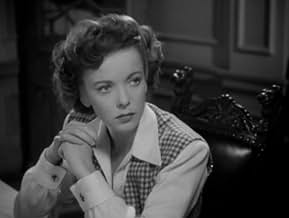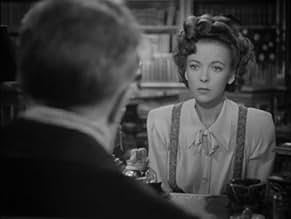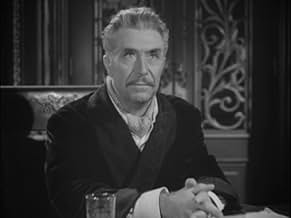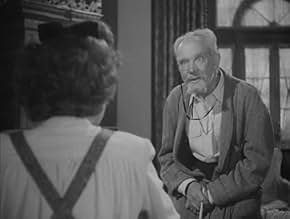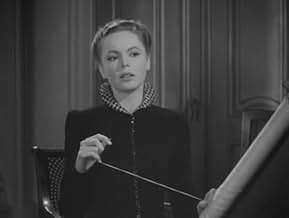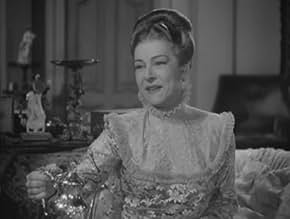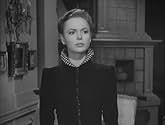Ajouter une intrigue dans votre langueA young woman traveling to Poland with her employer meets a count, and they fall in love as World War II begins.A young woman traveling to Poland with her employer meets a count, and they fall in love as World War II begins.A young woman traveling to Poland with her employer meets a count, and they fall in love as World War II begins.
- Réalisation
- Scénario
- Casting principal
Alla Nazimova
- Zofia Orwid
- (as Nazimova)
Harry Adams
- Ballet Attendee
- (non crédité)
Alex Akimoff
- Wine Seller
- (non crédité)
Sylvia Arslan
- Naneczka
- (non crédité)
Lynn Baggett
- Friend of Count Orvid
- (non crédité)
George Blagoi
- Polish Peasant
- (non crédité)
John Bleifer
- Wladek
- (non crédité)
Paul Bradley
- Ballet Attendee
- (non crédité)
Cyd Charisse
- Ballerina
- (non crédité)
Gino Corrado
- Peasant at Party
- (non crédité)
- …
Julius Cramer
- Polish Diplomat
- (non crédité)
Jane Crowley
- Party Guest
- (non crédité)
Avis à la une
Ida Lupino and Paul Henreid both were very good actors, but very often they were either cast as either supporting actors or starred in smaller and less prestigious films. Here, however, Warner Brothers put both of them in a top film and gave them both a chance to shine--and they were more than up to the task. In particular, Lupino was lovely. Her performance was strong but also with a lot of style--she really was in her element here.
The film begins in the mid-late 1930s in Poland. Ida and her boss (Mary Boland) are visiting the country to buy antiques to take back to Boland's business in England. Shortly after the story begins, a local nobleman (Henreid) meets Lupino and is obviously smitten with her. When he asks her to marry him, there is a bit of a scandal within the family--after all, she is just a commoner. This romance and its repercussions make up the first 2/3 of the film.
At the same time, there are small hints here and there about the upcoming invasion of Poland by the Nazis--something with which audiences of 1944 would have been well acquainted. Eventually, the Nazi hoards invade and Henreid is called to active duty and the inevitable conquest begins.
Overall, there is a lot to like about this film. As I said above, the acting is very, very good. Plus, Henreid and Lupino are ably assisted by various supporting actors that also rise to the occasion. The direction and cinematography are also first-rate. These factors, combined with a good story, make for a very good film--a propaganda film with greater depth than usual and which is still very watchable today.
The film begins in the mid-late 1930s in Poland. Ida and her boss (Mary Boland) are visiting the country to buy antiques to take back to Boland's business in England. Shortly after the story begins, a local nobleman (Henreid) meets Lupino and is obviously smitten with her. When he asks her to marry him, there is a bit of a scandal within the family--after all, she is just a commoner. This romance and its repercussions make up the first 2/3 of the film.
At the same time, there are small hints here and there about the upcoming invasion of Poland by the Nazis--something with which audiences of 1944 would have been well acquainted. Eventually, the Nazi hoards invade and Henreid is called to active duty and the inevitable conquest begins.
Overall, there is a lot to like about this film. As I said above, the acting is very, very good. Plus, Henreid and Lupino are ably assisted by various supporting actors that also rise to the occasion. The direction and cinematography are also first-rate. These factors, combined with a good story, make for a very good film--a propaganda film with greater depth than usual and which is still very watchable today.
Stumbled onto this on TCM ... granted, it's a wartime film to be sure - down to the "Buy War Bonds" cleverly configured Warner Brothers credit at the end, and brimming with patriotic emotion - but incredibly enjoyable/entertaining. I was happily surprised by all the talent in the cast - besides the ALWAYS wonderful Ida Lupino and the wonderfully debonair/attractive Paul Henreid (sigh!), it was delightful to see - albeit briefly - Mary Boland (for an extensive Mary Boland treat, check her out in "The Women"). And the rarely-seen-on-screen Alla Nazimova was illuminating ... while I heard her name being mentioned by the host, I didn't put it together until afterward. Great WWII Western European homefront film - highly recommend it!
A bit slow moving but nonetheless interesting. The only thing missing is Maria Ouspenskaya stirring a boiling cauldron.
Paul Henried and Ida Lupino fall in love near Warsaw. She's a British commoner employed by a fancy English antique collector. Paul and Ida meet by accident in an antique shop. After they do some innocent and tender kanoodling for a while, Paul decides to bring Ida home to meet the Fockers...oops...I mean the royal Orvid family.
Only philosophical uncle Leopold Baruta likes Ida. Paul's sister,Janina, hates her while the rest of the Orvids think she's not good enough for Paul. In the meantime, we encounter a guy who's supporting them all-- Count Pavel. The reason why he's a Count is because everyone watches him count his money to then disperse to them as monthly stipends.
Count Pavel is also a representative of Poland to Nazi Germany and he's convinced that, after Czechoslovakia, Hitler had no more territorial designs on Europe so it would be a good idea to give him the Polish Corridor so as not to tick him off into attacking Poland.
Ida begins to dislike the whole Orvid family and especially Paul's reliance on Pavel for dough. So she's about to hop a train to get her back to England when Paul promises to become independent and she buys into it. So they marry, start teaching the peasants how to till the land while Pavel seethes because this is no way for Polish nobility to act.
On Sept,1.1939, the Nazis invade Poland and begin bombing Warsaw. Paul puts on his military uniform and heads for battle. Ida is left home and somehow, she rallies the peasants into fighting the Germans which history proves to be an absurdity. She teaches them the "scorched earth" policy which history teaches was anachronistic because it was the Russians who employed it against the Nazis after 6/22/41.
However despite its flaws,it all makes for an interesting anti-Nazi, morale boosting film for us at home.
Paul Henried and Ida Lupino fall in love near Warsaw. She's a British commoner employed by a fancy English antique collector. Paul and Ida meet by accident in an antique shop. After they do some innocent and tender kanoodling for a while, Paul decides to bring Ida home to meet the Fockers...oops...I mean the royal Orvid family.
Only philosophical uncle Leopold Baruta likes Ida. Paul's sister,Janina, hates her while the rest of the Orvids think she's not good enough for Paul. In the meantime, we encounter a guy who's supporting them all-- Count Pavel. The reason why he's a Count is because everyone watches him count his money to then disperse to them as monthly stipends.
Count Pavel is also a representative of Poland to Nazi Germany and he's convinced that, after Czechoslovakia, Hitler had no more territorial designs on Europe so it would be a good idea to give him the Polish Corridor so as not to tick him off into attacking Poland.
Ida begins to dislike the whole Orvid family and especially Paul's reliance on Pavel for dough. So she's about to hop a train to get her back to England when Paul promises to become independent and she buys into it. So they marry, start teaching the peasants how to till the land while Pavel seethes because this is no way for Polish nobility to act.
On Sept,1.1939, the Nazis invade Poland and begin bombing Warsaw. Paul puts on his military uniform and heads for battle. Ida is left home and somehow, she rallies the peasants into fighting the Germans which history proves to be an absurdity. She teaches them the "scorched earth" policy which history teaches was anachronistic because it was the Russians who employed it against the Nazis after 6/22/41.
However despite its flaws,it all makes for an interesting anti-Nazi, morale boosting film for us at home.
Vincent Sherman's "In Our Time" tries to do for Poland what "Mrs. Miniver" did for England: raise American awareness to the plight of a European nation besieged by the Nazis. Unfortunately, the film wanders all over the hack-writing map from romance to propaganda to social issues and loses its focus early on. Even the style of the film shifts from intimate drama to semi-documentary with voice-over narration to stirring morale booster complete with back-lit clouds and beams of inspirational light. Despite the varied styles, the movie seems to linger on far too long despite a running time of less than two hours. By the time that the requisite patriotic speech has been made, the music has risen to stirring proportions, and the march towards the sunset has begun, many viewers may already have tuned out.
The unconvincing story begins in an antique shop where Ida Lupino, the young companion of Mary Boland, an English antiques buyer, meets Paul Henreid, a Polish nobleman. Only those who have never seen a Hollywood film from the Golden Age will be surprised by the Romeo-and-Juliet romance that develops or by the obstacles that stand between the couple and eternal bliss. Class-conscious family, impending war, and stubborn peasants are only some of the roadblocks to those inspirational beams that beckon on the horizon.
Unfortunately, some first-class talent has been lavished on this less-than-classic film. Ida Lupino is the shy companion to an overbearing employer. Within two hours, she blossoms into an assertive woman who fully supports and inspires her husband in his idealistic pursuits. Paul Henreid, whose seductive eyes and voice won Bette Davis and Ingrid Bergman, works his magic on Lupino. Like his role in "Casablanca," Henreid's character is caught up in patriotic fervor and self-sacrifice. Both leads are excellent although they cannot overcome the messy script. Silent film star Alla Nazimova offers especially fine support as Henreid's aristocratic mother. However, while the cast often rises above the writing, "In Our Time" remains dated in its message. Considering what Poland endured under Communism after World War II, many of the film's inspirational lines about fighting for the future ring with irony. Despite the length, lapses, and inconsistencies, Lupino, Henreid, and Nazimova make "In Our Time" worth a viewing, but the film is hardly a repeatable experience.
The unconvincing story begins in an antique shop where Ida Lupino, the young companion of Mary Boland, an English antiques buyer, meets Paul Henreid, a Polish nobleman. Only those who have never seen a Hollywood film from the Golden Age will be surprised by the Romeo-and-Juliet romance that develops or by the obstacles that stand between the couple and eternal bliss. Class-conscious family, impending war, and stubborn peasants are only some of the roadblocks to those inspirational beams that beckon on the horizon.
Unfortunately, some first-class talent has been lavished on this less-than-classic film. Ida Lupino is the shy companion to an overbearing employer. Within two hours, she blossoms into an assertive woman who fully supports and inspires her husband in his idealistic pursuits. Paul Henreid, whose seductive eyes and voice won Bette Davis and Ingrid Bergman, works his magic on Lupino. Like his role in "Casablanca," Henreid's character is caught up in patriotic fervor and self-sacrifice. Both leads are excellent although they cannot overcome the messy script. Silent film star Alla Nazimova offers especially fine support as Henreid's aristocratic mother. However, while the cast often rises above the writing, "In Our Time" remains dated in its message. Considering what Poland endured under Communism after World War II, many of the film's inspirational lines about fighting for the future ring with irony. Despite the length, lapses, and inconsistencies, Lupino, Henreid, and Nazimova make "In Our Time" worth a viewing, but the film is hardly a repeatable experience.
In Our Time English girl Ida Lupino goes traveling with a somewhat subdued
Mary Boland and meets up with a real honest to goodness count played by
Paul Henreid. It's a romance that develops between them and she becomes a
countess.
Henreid is the kind of guy rich girls married back in the day for the title. He has an estate that's tied up in debt. They have to modernize or go broke. But with war clouds on the horizon will they have a chance?
This film is a tribute to the resistance of the Polish people in much the same way Edge Of Darkness is to the Norwegians. It came to the attention of the House Un-American Activities Committee and its writer Hpward Koch made the blacklist.
When Ida Lupino talks about having the estate peasants share in the harvest and maybe bringing in tractors she runs into some bad reaction from Victor Francen the old mastodon head of the family. God made him an aristocrat and them peasants and as an aristorat he's entitled to the perks therein. All this talk about sharing and brotherhood got the HUAC investigators attention.
In the end there's a note of optimism as this film came out in 1944 and the tide of war had turned and the audience who saw In Our Time knew it. The collective cast members fates are left to your imagination.
This wartime film still holds up well even today as recent events show fasciam is very much alive in this world and in places Americans did not contemplate in 1944.
Henreid is the kind of guy rich girls married back in the day for the title. He has an estate that's tied up in debt. They have to modernize or go broke. But with war clouds on the horizon will they have a chance?
This film is a tribute to the resistance of the Polish people in much the same way Edge Of Darkness is to the Norwegians. It came to the attention of the House Un-American Activities Committee and its writer Hpward Koch made the blacklist.
When Ida Lupino talks about having the estate peasants share in the harvest and maybe bringing in tractors she runs into some bad reaction from Victor Francen the old mastodon head of the family. God made him an aristocrat and them peasants and as an aristorat he's entitled to the perks therein. All this talk about sharing and brotherhood got the HUAC investigators attention.
In the end there's a note of optimism as this film came out in 1944 and the tide of war had turned and the audience who saw In Our Time knew it. The collective cast members fates are left to your imagination.
This wartime film still holds up well even today as recent events show fasciam is very much alive in this world and in places Americans did not contemplate in 1944.
Le saviez-vous
- AnecdotesCount Stefan takes Jennifer on a walking tour of Warsaw. As they walk, stock footage is shown of various important monuments, culminating in the bronze statue of Chopin by sculptor Waclaw Szymanowski. These monuments were all systematically destroyed by the Germans in 1940.
- GaffesAt the ballet, Count Stefan and others in his box use the opera glasses to look down at Jennifer in the audience below. The first shot through the glasses shows her not looking straight up at Count Stefan, but to her right, even though they have acknowledged each other. In subsequent shots through the glasses, the perspectives are far too low and to the front of Jennifer to be from the box above.
- Citations
Count Pawel Orwid: [at the ballet] Stefan, when I was a young man, I came for the ballerinas. Later on I came for the music. Now I come to sit.
- Crédits fousAfter the WB logo appears at the end, the letters W and B are separated and letters added to form the words "BUY War Bonds".
- ConnexionsFeatured in Frances Farmer Presents: In Our Time (1959)
- Bandes originalesPolonaise in A major, Op.40, No.1 ('Military')
(1838-39) (uncredited)
Written by Frédéric Chopin
Partially played during the opening credits and at the end
Variation in the score throughout
Played on a radio to signal that Warsaw is still fighting
Meilleurs choix
Connectez-vous pour évaluer et suivre la liste de favoris afin de recevoir des recommandations personnalisées
Détails
- Date de sortie
- Pays d’origine
- Langue
- Aussi connu sous le nom de
- Aşk milyona bedel
- Lieux de tournage
- Société de production
- Voir plus de crédits d'entreprise sur IMDbPro
- Durée1 heure 50 minutes
- Couleur
- Rapport de forme
- 1.37 : 1
Contribuer à cette page
Suggérer une modification ou ajouter du contenu manquant


